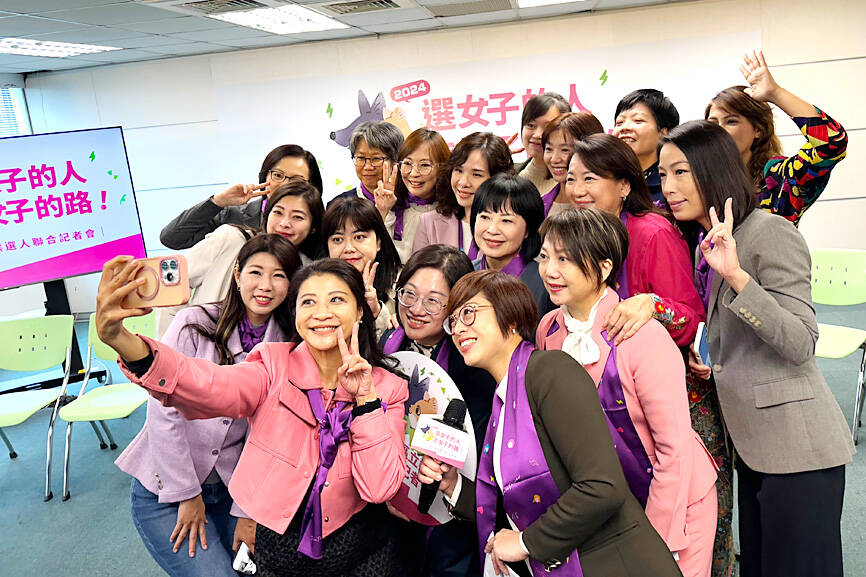The Democratic Progressive Party (DPP) yesterday presented its slate of 18 female legislator-at-large nominees and outlined its policies on gender equality.
The DPP has marked several milestones when it comes to women’s participation in Taiwanese politics, DPP Department of Gender Equality division director Lee Yen-jong (李晏榕) told a news conference at party headquarters in Taipei.
It was the first party in Taiwan to have a female vice president in Annette Lu (呂秀蓮), who assumed office in 2000, Lee said, adding that Lu also became the first female commissioner for then-Taoyuan County in 1997.

Photo: Chen Cheng-yu, Taipei Times
The nation’s first female president, Tsai Ing-wen (蔡英文), is also of the DPP, she said.
“We also have Taiwan’s first woman as representative to the US in Hsiao Bi-khim (蕭美琴), who is now our party’s vice presidential nominee,” she added.
She went on to introduce the 18 nominees, one of whom was absent due to a campaign commitment.
“In this election, the DPP has 34 people on its legislator-at-large list, and the 18 women make up more than half of the list,” Lee said. “This shows our party’s strong commitment to ensuring gender equality in government and policymaking.”
A constitutional amendment in 2006 approved a proportional representation system for legislator-at-large lists, requiring that women make up at least half of the nominees, Lee said.
Legislators-at-large mainly represent professional trades, special political blocs, civil organizations, rights advocacy, arts and cultural sectors and minority ethnic groups, as their election is based on total votes received by a political party in national elections.
Tseng Hsiang-hua (曾湘樺), director of the Kaohsiung-based Chuen Shang Shiang Farm Products Cooperative, led the female candidates in a speech, vowing to formulate better policies to help farmers and social workers.
“I have worked with them over the past 12 years to manage distribution channels for agricultural products and assist in upgrades for small businesses,” she said.
“As a legislator, I could continue agri-food education at the grassroots level to promote farmers and their food sources” and push for sustainable practices, she added.
Another prominent figure is Sophiyah Liu (劉柏君), who after years of training in Taiwan and the US, broke a gender barrier in 2006 by becoming Taiwan’s first female baseball umpire.
Liu said she would like to use her experience to strive for gender equality in sports.
She would engage in international diplomacy through baseball as a way to safeguard Taiwan’s democracy, she added.
In 2018, Liu was chosen by Forbes magazine as one of the 25 most powerful women in international sports, and her past work as a medium in temple religious rituals was the subject of the HBO Asia TV series The Teenage Psychic (通靈少女).
Writer, actress and artist Jean Kuo (郭昱晴) spoke of her past work on mental health among young people and on counseling in schools.
Known as Teacher Wan (萬老師) from the popular 2000s drama Spicy Teacher (麻辣鮮師), Kuo said she would also focus on improving working conditions for those in Taiwan’s entertainment sector.

Nipah virus infection is to be officially listed as a category 5 notifiable infectious disease in Taiwan in March, while clinical treatment guidelines are being formulated, the Centers for Disease Control (CDC) said yesterday. With Nipah infections being reported in other countries and considering its relatively high fatality rate, the centers on Jan. 16 announced that it would be listed as a notifiable infectious disease to bolster the nation’s systematic early warning system and increase public awareness, the CDC said. Bangladesh reported four fatal cases last year in separate districts, with three linked to raw date palm sap consumption, CDC Epidemic Intelligence

The manufacture of the remaining 28 M1A2T Abrams tanks Taiwan purchased from the US has recently been completed, and they are expected to be delivered within the next one to two months, a source said yesterday. The Ministry of National Defense is arranging cargo ships to transport the tanks to Taiwan as soon as possible, said the source, who is familiar with the matter. The estimated arrival time ranges from late this month to early next month, the source said. The 28 Abrams tanks make up the third and final batch of a total of 108 tanks, valued at about NT$40.5 billion

Two Taiwanese prosecutors were questioned by Chinese security personnel at their hotel during a trip to China’s Henan Province this month, the Mainland Affairs Council (MAC) said yesterday. The officers had personal information on the prosecutors, including “when they were assigned to their posts, their work locations and job titles,” MAC Deputy Minister and spokesman Liang Wen-chieh (梁文傑) said. On top of asking about their agencies and positions, the officers also questioned the prosecutors about the Cross-Strait Joint Crime-Fighting and Judicial Mutual Assistance Agreement, a pact that serves as the framework for Taiwan-China cooperation on combating crime and providing judicial assistance, Liang

A group from the Taiwanese Designers in Australia association yesterday represented Taiwan at the Midsumma Pride March in Melbourne. The march, held in the St. Kilda suburb, is the city’s largest LGBTQIA+ parade and the flagship event of the annual Midsumma Festival. It attracted more than 45,000 spectators who supported the 400 groups and 10,000 marchers that participated this year, the association said. Taiwanese Designers said they organized a team to march for Taiwan this year, joining politicians, government agencies, professionals and community organizations in showing support for LGBTQIA+ people and diverse communities. As the first country in Asia to legalize same-sex